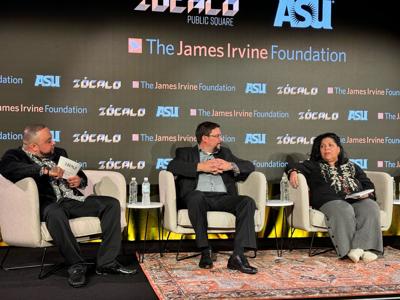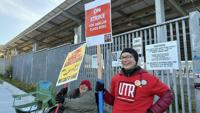
Zócalo Public Square, in partnership with The James Irvine Foundation, hosted a captivating and timely discussion titled "What is a Good Job Now?" for the formerly incarcerated. The event took place last Wednesday at the ASU California Center in Los Angeles.
Founded in Los Angeles in 2003, Zócalo Public Square is an ASU Media Enterprise. Zócalo's mission is to seek intellectual space and engage a new and diverse generation in the public square. The James Irvine Foundation’s focus is to connect Californians to good jobs with family-sustaining wages and advancement opportunities. “What Is a Good Job Now?” is a series supported by The James Irvine Foundation.
The ongoing series examines the real-life effects of changes in state and local policy that have been intended to help workers, including formerly incarcerated people and gig economy contractors in communities across the state.
The moderator of the discussion was Gilbert Johnson, Director of Strategic Reentry Initiatives, Office of Mayor Karen Bass. “Johnson was introduced to civic engagement in 2009, which marked the last year that he was incarcerated,” said Binca Collins, director of Public Programs for Zócalo Public Square.
After being incarcerated, Johnson’s life was different, he struggled to maintain a job, he struggled with homelessness and had several jobs due to his criminal records. But his life changed when he was given the opportunity to become an outreach worker for the Community Coalition (CoCo) and eventually became a lead justice organizer. After leaving CoCo he became California’s TimeDone statewide manager where he helped pass multiple state-level justice reforms bills and then worked with the mayor.
Panelist guests for the event were Amity Foundation president and CEO Doug Bond, Root & Rebound executive director Carmen Garcia, and Anti-Recidivism Coalition executive director Sam Lewis. All three panelists shared personal experiences with the audience and discussed how to build better career pathways for formerly incarcerated people.
Some of the key points for the discussion were identifying ideas and models for finding good jobs for the formerly incarcerated, addressing low pay and challenging working conditions in industries employing this population and exploring policies and economic changes to open more career paths and economic opportunities.
Johnson, before starting the discussion, mentioned that in the past he has done some level of work with the panelists and wanted to thank them for doing the hard work. “They are in the trenches doing the hard-work, running programs that are changing lives, that are reducing crimes and violence, that are preventing and eradicating recidivism. And [it] is work that is so crucial to our communities to our movement, towards progress,” Johnson said.
Executive director Carmen Garcia, who was also formerly incarcerated, was one of the first hires in Root & Rebound. She was a legal assistant in 2014 and most recently deputy director of finance and operations. Garcia was asked by Johnson, "Why does the mainstream media target and change the narrative of people who were formerly incarcerated?"
She responded, “I think it has to do with language for the formerly incarcerated people, because when you define someone and you box them in that place of convict, inmate and criminal, it’s really hard and challenging for the person in that situation to move forward and look for a job,” she said. “We start to create our own narrative about who that person is instead of what that person can be.”
According to a data report by Vera Institute of Justice out of all the counties in California in 2021, Los Angeles County has the highest county jail population, and most people sent to state prisons. While Black people are arrested at disproportionately high rates, Latinos are also arrested on a daily basis, with the second highest rate. In addition to the report, criminal legal system statistics often misclassify Latinx people as white, which leads to undercounts of Latinx arrests and overcounts of white arrests.
Johnson also brought to the discussion a crucial point, which was about the historical aspect about formerly incarcerated people. He said that those who have been incarcerated have been faced with being locked out of an entire job market and sectors. “This is due to the systemic barriers that are imposed with legal restrictions and legal sanctions that are imposed for no reason other than to punish and victimize,” he said.
Doug Bond added, “There’s a lot of victories. Historically there are thousands and thousands, actually 24,000 restrictions, for folks that are coming home with barriers. And that’s state by state, county by county, city by city and federally throughout the U.S. So, there's a lot of work to be done.” Bond transitioned into the role of CEO of Amity Foundation in July 2018 following the succession plan developed with the Founder/CEO Rod Mullen who served in the position for over 35 years. Bond first came to Amity in 1983 after being in several foster homes and was reunited with his father who had been incarcerated.
Johnson spoke about the policy change that needs to be done and how it’s critical to the movement and getting individuals free. He also asked Sam Lewis, executive director of Anti-Recidivism Coalition the following question: "What are your thoughts on the intersections of those social economic conditions that were pretty much imposed on our communities and the role that poverty plays in crime and violence?"
“Great question, I first want to touch on a couple of key points. I don't want any of my people to come to me to get a job, I want them to have careers. I want them to be entrepreneurs and run million dollar corporations. If you have the skill set, then you should be able to do that. And if you don’t have the skill set then [seek for] organizations like Underground Scholars and others,” he said. “I want people to have jobs and not have to worry about anything but getting up and just demonstrating that they are the best in what they do and coming home to their families.”
His second key point was about policy change and barriers for the formerly incarcerated. “Senate Bill 731 talks about a clean slate across the United States. California is leading the way. My conviction was for murder and three attempted murders. And I had my record expunged on November 9th,” Lewis said.
He also added, “California is the only state that will allow right now for a person that has paid their debt to society and has demonstrated their contributing tool to the gains of our society the opportunity to put their past behind them. Time is done, It’s over.”
His third key point is based on generational wealth vs generational poverty. “People that are locked out of those opportunities are people of color. So, we couldn't build generational wealth,” he said.
He also said that every group doesn’t have access to opportunities of generational wealth and those are all part of the systemic poverty. “About 40 million Americans live at or below the poverty line and in order to fix that there needs to be a political will.”
The event ended with all of the guest speakers answering questions from the audience. To learn more about the foundations, click the following links: Amity Foundation, Root & Rebound, Anti-Recidivism Coalition. The livestreamed event is available to watch here.











(0) comments
Welcome to the discussion.
Log In
Keep it Clean. Please avoid obscene, vulgar, lewd, racist or sexually-oriented language.
PLEASE TURN OFF YOUR CAPS LOCK.
Don't Threaten. Threats of harming another person will not be tolerated.
Be Truthful. Don't knowingly lie about anyone or anything.
Be Nice. No racism, sexism or any sort of -ism that is degrading to another person.
Be Proactive. Use the 'Report' link on each comment to let us know of abusive posts.
Share with Us. We'd love to hear eyewitness accounts, the history behind an article.